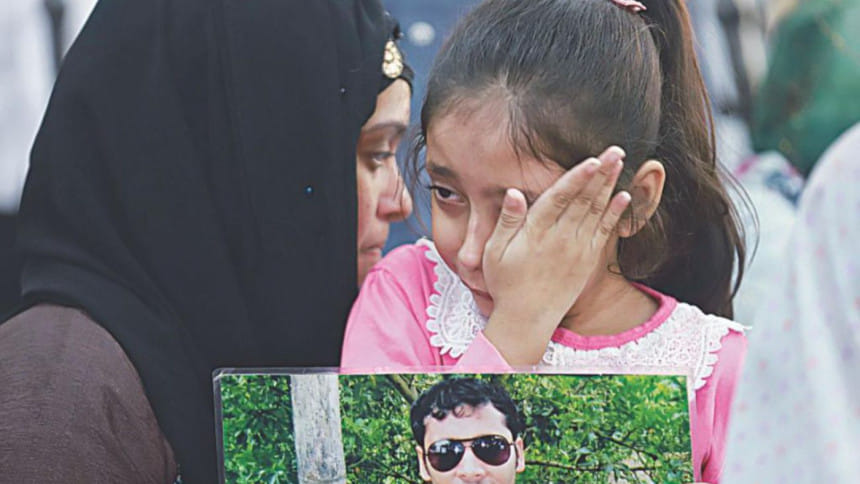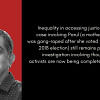Rights at stake in Bangladesh on Human Rights Day

At a time when the most powerful countries in the world are closing their doors to refugees, Bangladesh has allowed in more than 700,000 Rohingya people, who fled violent attacks by the military in Myanmar since August 2017. Prime Minister Sheikh Hasina has shown tremendous compassion and courage at embracing such a large population in spite of Bangladesh's own socioeconomic challenges.
As of November, the international community's response to the financial assistance needed to support the Rohingya refugees has met 72 percent of the USD 950.8 million appeal made by the UN for 2018. What is worrying though is that the funds for the refugees in Bangladesh may dry out soon as focus shifts to crises in countries such as Yemen.
It is crucial that the international community approaches the Rohingya situation more pragmatically that would not just see this as a short-term crisis funding and evaluate the economic diplomacy that can empower the Rohingya people.
Nearly 60 percent of the Rohingya refugee population are children, who would have a much better future with early intervention in their upbringing. The potential of these children would be wasted without providing them with access to health and education.
The responsibilities of the international community towards the Rohingya coincide with the development funds and assistance they provide to Bangladesh in areas of poverty alleviation and governance. It is therefore even more crucial that countries like the United States, UK, Japan, Canada, Australia and Switzerland, which have a development focus in Bangladesh, take the issues of Rohingya and some of the key human rights on table, to look at the bigger picture of how this affects the country's development.
Equally important is the need to ensure accountability on the Myanmar side of the border, and for Bangladesh to continue to meet its obligations by ensuring that refugees are not forcibly returned against their will or removed to places which will only increase their suffering and hardship.
As Bangladesh prepares to hold the 11th parliamentary elections shortly, now is the time that political parties should commit to do away with some of the dangerous laws and actions that violate international human rights laws.
Legitimising repression
A highly repressive Digital Security Act, which was enacted in October, is hardly any relief for the people of Bangladesh especially when many have been arrested in the past six years under the preceding Information and Communication Technology Act.
Previously, Bangladeshi authorities used section 57 of the ICT Act to criminalise freedom of expression if they are deemed to "hurt religious belief" or "deteriorate law and order." If convicted, a person could face up to 14 years in jail.
Several ministers of the government assured that the draconian sections would be repealed with the new Digital Security Act coming in place.
Sadly, the new Act expanded section 57 of the ICT Act into multiple sections, broadened the remit of the authorities to penalise people with up to life imprisonment for exercising freedom of expression, and empowered invasive online surveillance.
Eminent Bangladeshi photographer Shahidul Alam was arrested in August under section 57 of the ICT Act shortly after he criticised the Bangladesh government's crackdown on a student protest for road safety in a televised interview. Though released on bail after more than 100 days, after the prosecution failed to corroborate the accusation against him, he could still face a jail term up to 14 years if proven guilty.
Bangladesh must drop cases against Shahidul Alam and all those punished for freely exercising their right to freedom of expression and association, which is one of the rights enshrined in the International Covenant on Civil and Political Rights, which Bangladesh has ratified.
Alleged enforced disappearances
A year has passed since former diplomat Maroof Zaman had disappeared when he was on his way to receive his younger of the two daughters from the Dhaka airport on December 4, 2017. His car was found abandoned near the airport. The government has repeatedly refused to acknowledge crimes of enforced disappearance by state agencies, but local human rights organisations have documented at least 71 cases of alleged enforced disappearances this year.
Denying the incidents hardly provides assurance that the crime does not exist, simply because of the alarming number of incidents reported by the families.
Enforced disappearance is one of the cruellest forms of human rights violations. People are taken away by people acting on behalf of the state, who later deny the action, leaving the families devastated and desperate to find closure.
It is important that the authorities put an end to the crimes and ensure closure for the families through prompt, effective, independent and impartial investigations.
Many families have said their relatives were picked up by the law enforcement agencies, particularly the police and Rapid Action Battalion, days before they were killed in alleged "crossfires".
Local human rights organisation Ain O Salish Kendra has said that a total of 437 extrajudicial executions have been allegedly committed by security forces in Bangladesh in the first 10 months of 2018. At least 276 of these killings were carried out only since May, after Prime Minister Sheikh Hasina announced an anti-drug drive.
Many of the victims of alleged extrajudicial executions were breadwinners for the families that have become vulnerable in their absence.
The ruling Awami League did nothing to stop extrajudicial executions introduced first by the Bangladesh Nationalist Party by launching the Rapid Action Battalion in 2004 to combat serious crimes. Prime Minister Hasina had vowed to disband RAB during her political campaigns before assuming power in 2008. The need to uphold the moral values has become more crucial now than ever.
Rights of indigenous peoples
At least 22 members of regional political parties at the Chittagong Hill Tracts, home to over 25 indigenous peoples, have been killed allegedly in internecine conflicts.
Two members of the Hill Women's Federation, Doyashona Chakma and Monty Chakma, accused the law enforcement agencies of their complicity when they were abducted by a group of men in March. They were released on condition that they would give up politics.
In March 2018, Amnesty International called for an independent investigation into the sexual assault of two Marma sisters, allegedly committed on January 22. Two Tripura girls were allegedly raped in the region by members of the law enforcement agencies on August 22.
The Bangladesh authorities must launch independent and impartial investigation into the crimes against members of the indigenous community.
Human rights defenders
Bangladesh's Election Commission abruptly cancelled the registration of a prominent human rights organisation on November 6, 2018 as observer for the 11th parliamentary elections.
Even as a decision remains pending on the status of Odhikar, the NGO bureau has frozen all bank accounts of this local human rights group since April 2014.
Rights groups including Transparency International in Bangladesh are concerned about state repression on them under the Foreign Donations (Voluntary Activities) Regulation Act 2016. The Act empowers the bureau to cancel registration and confiscate foreign donation of organisations for making comments that the government finds "indecent" about the constitution or any constitutional institutions of Bangladesh.
Shutting down activities of human rights organisations cannot become an example of a country that has become an elected member of the UN Human Rights Council this year.
Bangladesh government must allow human rights organisations to function independently, without intimidation, and uphold freedom of expression and association of people in line with its ratification of the International Covenant on Civil and Political Rights.
Saad Hammadi is Regional Campaigner for South Asia at Amnesty International.









Comments